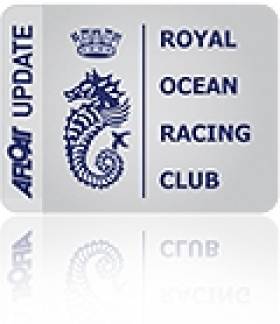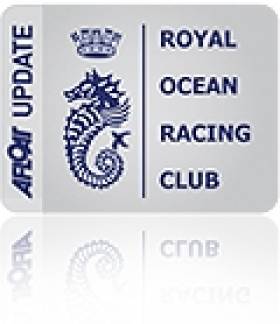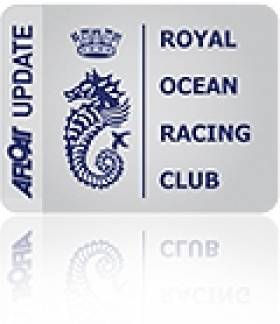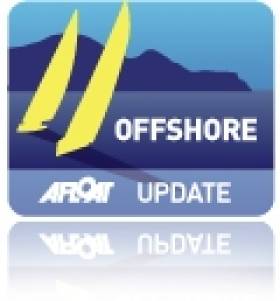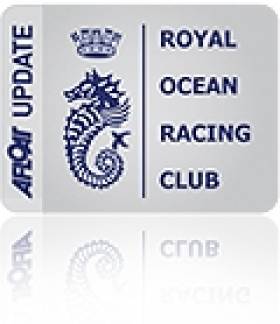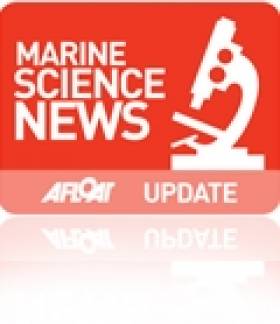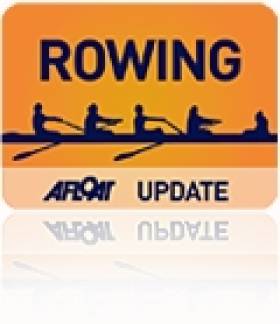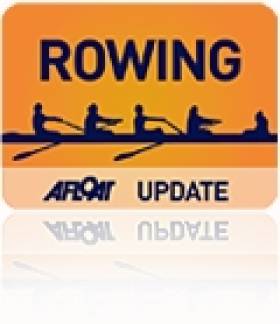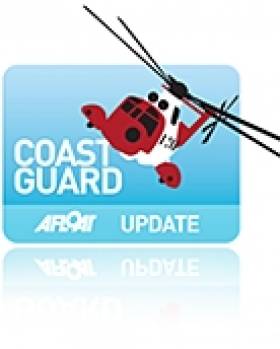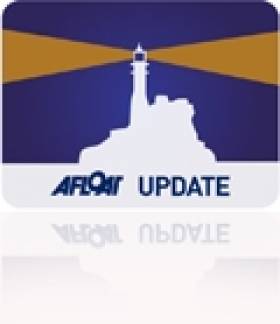Displaying items by tag: Transatlantic
RORC TransAtlantic Favourite Returns to Port With Broken Boom
#rorc – After leading the RORC fleet out of the Canary Islands yesterday afternoon the Finot-Conq 100, Nomad IV, sailed by Jean-Paul Riviere, was leading the race until gear failure forced the French Maxi to head back to the Canary Islands for repairs writes Louay Habib. All of the crew are safe and well. At about 2000 UTC on Monday 1st December, Nomad IV was approximately 110 miles south west of La Palma when the RORC Transatlantic tracker showed the boat had turned around and was heading back towards the Canaries.
The inaugural RORC Transatlantic Race, in association with the International Maxi Association (IMA), started on Saturday 30th November 1000 UTC from Puerto Calero, Lanzarote, Canary Islands bound for Grenada, West Indies, 2,995 nautical miles across the Atlantic Ocean.
At 2138 UTC, Nomad IV contacted the RORC Race Committee by satellite link to report that the boom of the 100ft Maxi had broken but that all were safe on board. The RORC Race Committee have remained in contact with Nomad IV and it is understood that the crew do not require assistance and plan to head back to the Canaries, probably Tenerife, to effect repairs.
Nomad IV was the hot favourite for Line Honours for the RORC Transatlantic Race to win the prestigious IMA Trophy and hopefully the team can effect a repair that will allow them to re-continue. However, the incident occurred over 100 miles out into the Atlantic and the French team will have virtually no chance of catching the front runners, even if a solution to the problem can be found quickly.
Nomad's misfortune means that at dawn on day three, the battle for the overall lead is between Jeremy Pilkington's RP78, Lupa of London and Russian Southern Wind 94 Windfall, skippered by Fabrizio Oddone. Windfall was 50 miles north of Lupa of London's position but in terms of distance to the finish, the two yachts are neck and neck. Windfall is positioned to skirt south around a high pressure system, which the Maxi will intend to slingshot around. Meanwhile Lupa of London seem to have taken a more conservative approach, keeping further away from the system and staying further south. The wind is due to veer east in the coming days and go lighter. If the wind does veer this will free off Windfall's angle before Lupa of London.
American Class40 Oakcliff Racing, skippered by Hobie Ponting, has had a great last 24 hours, sailing past Aref Lahham's Yacana in the early hours of this morning and at 0800 UTC was 11 miles ahead. However, Yacana, a classic Swan 68, is still estimated to be leading IRC One.
Currently 4th in IRC One, making 8.7 knots and 3 miles ahead of Sérénade, is the bright yellow Pogo 40, Bingo. One of four French teams in the race, Bingo is owned by husband and wife team from Paris, Isabelle and Yves Haudiquet and sailed with their long-time friends, Jean François Haupt and Pierre Crepin. Yves Haudiquet, from Yacht Club Paul Vatine, Le Havre, commented before the start: "I'm a lucky man with a 40ft boat able to surf day after day with the alizé (tradewinds) and with a motivated crew. My boat was built to compete in this sort of race and I'm hoping for a long surf ride and to increase the average boat speed from my last crossing."
Nigel Passmore's British J/133, Apollo 7 is currently leading IRC Two. The Plymouth team had an excellent night, blasting along under Code Zero to open up a 22 mile lead by dawn on Frank Lang's French X-40, Optim'X.
Follow the progress of the race via the fleet tracker: http://rorctransatlantic.rorc.org/tracking/2014-fleet-tracking.html
RORC Transatlantic Race Underway, Finally!
#rorc – After two delays to the start due to horrendous weather conditions, the RORC Transatlantic Race in association with the International Maxi Association started from Puerto Calero Marina at 1000 UTC, Sunday 30th November.
It was third time lucky as the RORC fleet departed Puerto Calero Marina, Lanzarote bound for Camper & Nicholsons Port Louis Marina, Grenada West Indies, 3000 miles away across the Atlantic Ocean. Rain squalls had been disturbing the air in the early hours of the morning, but virtually nothing would have prevented the eager fleet to set off on the inaugural RORC Transatlantic Race. Sunshine and a gentle northerly breeze prevailed for the start - the only abnormal weather feature was a perfect double rainbow, pointing the way to the turning mark off Marina Lanzarote, Arrecife - the only mark of the course before the fleet would make landfall in Grenada.
American Class40, Oakcliff Racing, skippered by Hobie Ponting, got away well and took an inshore line to take the lead. However, the young team from Rhode Island were soon overhauled by a trio of Maxi yachts; Jean-Paul Riviere's French Finot 100, Nomad IV, Russian Southern Wind 94, Windfall skippered by Fabrizio Oddone and Jeremy Pilkington's British RP78, Lupa of London.
The rainbow was not the only surreal experience at the start, a fleet of young Spanish Optimist sailors had decided to use the yellow inflatable turning mark for a training session. However, three loud blasts from the coach's whistle recalled the young sailors to a safe position, as humming deck gear and huge sail area, announced the imminent arrival of the Maxi fleet. No doubt the young sailors will tell the tale for years to come.
Five hours into the race, Nomad IV had rounded the southern tip of Lanzarote just ahead of Windfall and Lupa of London. Derek Hatfield's Canadian Volvo 60, Spirit of Adventure was leading the chasing pack. Frank Lang's French X-40, Optim'X showed impressive speed, making the turning mark in the company of Class40, Oakcliff Racing and ahead of Nigel Passmore's British J/133, Apollo 7.
Quotes from the start of the RORC Transatlantic Race:
Optim'X skipper, Frank Lang is taking part in his fifth Transatlantic race:
"I wanted to participate in this new RORC adventure and to share the experience with sailing friends," commented Frank. "We're looking forward to some fun racing and competition and to the long spinnaker surf rides bought on by the trade winds. It will be interesting to compare our result on corrected time with the big boats in the fleet."
Don José Calero, President Calero Marinas:
"It has been an absolute pleasure to see the impressive racing machines for this inaugural RORC Transatlantic Race in Puerto Calero. We have enjoyed hosting the crews and helping them to discover our incredible island of Lanzarote and we are pleased that they seem to have appreciated everything that Puerto Calero Marina has to offer."
"We would like to thank Eddie Warden Owen and the RORC team for choosing Puerto Calero for what we very much hope will become an established and popular annual event and we are already looking forward to next year for the second edition of the RORC Transatlantic Race."
RORC CEO, Eddie Warden Owen:
"Just over two years ago, the RORC decided to start a transatlantic race and it is just fantastic to see these yachts away. I am delighted to see a really co
mpetitive start. They were all pushing very hard, even though it is an endurance test for them, I am very proud to see them all going especially after the amazing weather we have had this week. The plan has come together, we have 11 boats for the first edition, but this race will grow and become a classic in the future."
RORC Admiral & Secretary General of the IMA, Andrew McIrvine:
"It is an impressive sight to watch the Maxis powering away. Once the breeze came up, the acceleration was absolutely phenomenal and they just sped away from the rest of the fleet and I am sure the Maxis will have a great battle. They have only been going for an hour, but they are already changing sails and employing boat-on-boat tactics and the lead has changed three times already. This is a perfect race for Maxis at a perfect time of year to cross the Atlantic in superb conditions to take part in the IMA Caribbean season."
RORC Transatlantic Race Suffers Second Postponement
#rorc – The start of the RORC Transatlantic Race has been further delayed due to adverse weather conditions. A further amendment to the Sailing Instructions was posted by the Race Committee delaying the scheduled start to 1000 UTC Sunday 30th November.
The Race Committee made the decision to postpone the start because the forecasted weather conditions for a decrease in wind as the day progressed has not materialised. In fact the wind has increased during the day to a steady 35+ knots with gusts in excess of 40 knots (and higher!) and the committee were concerned at the ability to lay a start line in the deep water off Puerto Calero Marina as well as the competitors' ability to manoeuvre safely in the confines of the marina.
The race will now start on Sunday 30th November at 1000 UTC.
#routedurhum – It has been a dramatic night with 15 incidents across the classes, including a collision between an Ultime trimaran and a cargo ship, the air rescue of a sailor after his boat lost its keel and overturned, and a Multi50 sailor who is awaiting help after his float broke off.
Thomas Coville saw his hopes of winning the Route Du Rhum vanish during the first night of the trans-Atlantic race when he damaged his yacht in a collision with a cargo ship.
Competing in the Ultimate class, the skipper of Sodebo Ultime escaped uninjured but damaged the starboard float on his boat.
Coville, who won the 3,542-nautical mile (6,560-kilometer) leg between Saint-Malo and the French Caribbean island of Guadeloupe in 1998 in the monohull class, was among the favorites for this year's race.
Another French skipper, François Angoulvant, had to be rescued after his Class 40 Team Sabrosa lost its keel. Angoulvant was airlifted to Brest where he is in good condition, according to race organisers.
Loick Peyron was leading the field early Monday aboard Banque Populaire VII.
Clipper Race chairman and founder, Sir Robin Knox-Johnston, has sent his first blog since he started Transatlantic solo race, the Route du Rhum - Destination Guadeloupe yesterday at 1400 CET from Saint-Malo, France.
With winds of 30 knots plus and large seas reported overnight, Sir Robin sent this report from his Open 60, Grey Power, this morning.
A grey sea, overcast, light drizzle and a West South Wester'ly Force 5 greeted me at dawn this morning. I am currently 40 miles from Ushant and debating whether to take the inner side of the Traffic Separation zone. Currently making 6-7 knots. Could do more if I put up more sail but we'll stay like this for the time being, as the wind is still 20 plus knots and gusting higher, just had one of 29 knots and the sea very lumpy.
It's a long race, and no point in breaking things at the beginning. I made a very cautious start. My Clipper Race colleague Simon Johnston was with me until half an hour before when my Rhum class competitor Bob Escoffier sent his rib to take him ashore. He has been invaluable, as was fellow colleague Alex Dower.
I soon found myself surrounded by 40's most of yesterday evening, pushing hard. Those boats are quick, but when the forecast squalls of 40 knots arrived I would not have wanted to be in one. Fortunately I had decided to settle in on the first night, so already had 3 reefs in the main and the storm jib set, but the boat was still pushed hard over and even with the mainsail pushed right down its track, was crashing into the waves.
I saw a couple of Automatic Identification Scheme targets turn round, I think they were in the race, but it was a gear breaking situation if you did not think of the boat and try to get her comfortable. We came through without damage, except for the staysail sheets becoming amorous, and it took a dark, cold wet hour on the foredeck, often under water, sorting out the resulting snakes' honeymoon.
Now typing this on a jumping boat is far from easy, as the computer often skips a letter or inserts one you did not ask for.
I am wondering how the big multis are fairing and if everyone is alright. There was some mention on Channel 16 last night but it was in fast spoken French.
C'est tout pour le moment.
RKJ
New Transatlantic Race for 2014 Announced by RORC
#offshore –A brand new offshore race taking yachts from Europe to the Caribbean has been annuonced by leading offshore body, the Royal Ocean Racing Club in London. The RORC Transatlantic Race will set off from Lanzarote, Canary Islands and finish in the Caribbean, at a destination to be confirmed. The 2,800 nm east to west race will act as a feeder for yachts participating in the 2015 RORC Caribbean 600, held annually in February from Antigua.
The RORC racing calendar attracts sailors from all over the world to compete during the season in over 20 races and comprises a series of highly competitive inshore and offshore IRC Rated events throughout the year. The new RORC Transatlantic Race will be the longest and final race in 2014, making it another busy year for the London-based Club. It follows a season of regular RORC races as well as the international Sevenstar Round Britain and Ireland Race and Brewin Dolphin Commodores' Cup.
"In the past the club has been involved with the Atlantic Rally for Cruisers (ARC) who have a racing division, but with increasing interest in the RORC Caribbean 600 every February, the number and quality of serious race boats making the crossing has required a specialist RORC event all of its own," explains RORC Commodore, Mike Greville. "We're delighted to be working with such keen racers as the Calero family and using the fabulous marina facility they have in Lanzarote and we look forward to a long and happy relationship."
Puerto Calero - Host Port
The host port for the start of the race will be the 450-berth Puerto Calero Marina situated on the south side of Lanzarote, only 15 minutes from the island's international airport. The Calero family are no strangers to hosting big events.
"We are delighted the RORC has chosen our marina to host the start of the RORC Transatlantic Race in November next year," said José Juan Calero. "We have all the facilities required by a yacht making an Atlantic crossing: a fully equipped boat yard and repair service, food and supply shops and we are very proud of all the restaurants and hotels we have around the marina. These all make for a pleasant and relaxing time for competitors in advance of the start."
In November, Puerto Calero will once again play host port to the RC44 Championship Tour. Returning to Lanzarote for the sixth consecutive year since 2008, this will be the third time the Island has hosted the Championships. It is one of three classes - TP52 and GP42 - to have held their world championships at Puerto Calero.
The marina is also home to Team SCA, the all female crew training for the 2014-15 Volvo Ocean Race and Ericsson, Groupama and Puma have held training camps here in recent years.
Canarian Meander
Lanzarote is the most eastern island of the Canarian archipelago and it is the RORC's intention that the race course will meander through the islands before venturing out into the Atlantic.
The race, commencing over the weekend of the 28th and 29th November 2014, will be run under OSR Category 1 and the start date will allow time for competitors in the Rolex Middle Sea Race to get to the start of the RORC Transatlantic Race in good time and for the yachts to finish in the Caribbean before Christmas.
To register interest and for more information, contact the RORC Race Office: T: +44 (0) 207 518 3131 and email: [email protected]
Canadian Ambassador Boards RV Celtic Explorer at Galway Docks
#marine science – Irish and Canadian scientists join forces on a transatlantic survey onboard the Irish National Research Vessel, RV Celtic Explorer which sets sail today for the Labrador and Newfoundland Seas to carry out fisheries research.
Canadian Ambassador to Ireland, his Excellency, Loyola Hearn, boarded the RV Celtic Explorer at Galway Docks today to meet the Irish and Canadian collaborators in this transatlantic expedition from Galway to St. Johns, Newfoundland.
The survey led by Dr George Rose, Director of the Centre for Fisheries Ecosystems Research at the Fisheries and Marine Institute of Memorial University of Newfoundland (MUN), is multidisciplinary and will gather oceanographic data as well as acoustic recordings across the entire North Atlantic, building on work done on the two previous transatlantic surveys in 2011 and 2012. Canadian scientists will be joined onboard by Irish researchers from National University of Ireland, Galway (NUI Galway) and Mayo Institute of Technology (GMIT). Sheena Fennell, NUI Galway will carry out oceanographic monitoring throughout the journey to St. John's and will collaborate with Dr Rose on the acoustic data collected during the transatlantic trip. The aim is to search for 'hot spots' of smaller mid-water fish, such as lanternfish and begin to understand their distribution.
The vessel will research the cod stocks on the Flemish Cap en route to Newfoundland and Labrador before completing a large scale survey for cod and capelin in Newfoundland and Labrador waters. As a former Minister of Fisheries and Oceans, Loyola Hearn was particularly interested to board the RV Celtic Explorer ahead of it transatlantic passage to Newfoundland and Labrador. Mr. Hearn said, "We are now seeing growth in the fish stocks off Newfoundland and Labrador, and surveys like this provide essential information on the sustainability of fish stocks. The potential for increased involvement both in ocean research and the fishing industry between Ireland and Canada is now being realised. The Celtic Explorer is an ideal ship to carry out this research which will be of such great benefit to both countries."
Dr. Peter Heffernan, Chief Executive, Marine Institute said, "This transatlantic collaboration is hugely important for Ireland and builds on the strong relationship between Ireland and Newfoundland and Labrador established since the first Newfoundland survey on the Celtic Explorer in 2011. It will allow Irish researchers to forge strong links with their Canadian counterparts as part of a wider international ocean observatory initiative. This is particularly relevant in the context of the European Union's Atlantic Strategy and the emerging Action Plan, which is on course to be completed during the Irish Presidency of the EU.
"This type of multidisciplinary research and international cooperation is essential to achieving healthy marine ecosystems – which is a key goal of the Government's Integrated Marine Plan for Ireland - Harnessing Our Ocean Wealth, published in 2012. We are delighted with this collaboration with our Canadian partners".
Dr. George Rose reiterated those sentiments, saying "This voyage continues to have tremendous value to both Irish and Canadian researchers, and contributes significantly to the knowledge base and prosperity of the Newfoundland and Labrador fisheries. I look forward to the continuance of this collaboration".
During the passage, an observational platform that sits on the seabed called a benthic lander system, will be deployed at a depth of 800-900m in a canyon on the continental shelf off the Irish Coast to measure turbidity, flouresence, temperature, salinity, water column and near seabed currents. The lander will remain in the canyon until June when it will be recovered during an NUI Galway led biodiscovery survey onboard the Celtic Explorer.
A Galway and Mayo Institute of Technology researcher will monitor cetacean activity during the passage across the Atlantic to Newfoundland and Labrador.
University College Cork graduate, Rachel Morgan will join the survey through the Training Through Research Surveys Scheme, run by the Strategic Marine Alliance for Research and Training (SMART). The programme gives young Irish researchers an opportunity to gain an invaluable experience on multidisciplinary surveys.
The survey is primarily funded through charter of the national research vessel by the Fisheries and Marine Institute of Memorial University. It builds on a strong collaborative relationship between the Irish Marine Institute and the Marine Institute of MUN and facilitates a transatlantic multidisciplinary survey which brings together experienced Irish and Canadian oceanographers, marine biologists, benthic ecologists, as well as young researchers who will gain invaluable experience onboard this survey.
Participation of third level students is funded though the Strategic Marine Alliance for Research and Training (SMART) programme.
Kelly Resting Aboard Cargo Ship After Capsize
#ROWING – Ocean rower Aodhan Kelly is travelling the opposite direction to the one he expected this morning – but he is reported to be safe and well after a tumultous 24 hours. The Dubliner and the five other men in the crew of the Sara G were hoping to set a new record for rowing across the Atlantic from Morocco to Barbados, but they capsized at 11 am yesterday 520 miles from their destination.
The six men stayed in a life-raft t until rescued by the cargo ship the Nord Taipei. The 32,000 tonne craft is continuing on to Gibraltar and is due to arrive on February 9th.
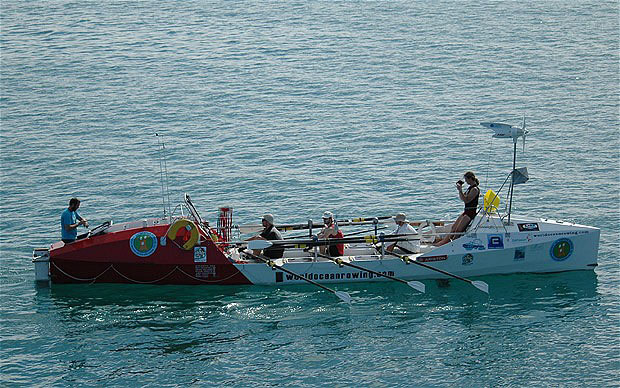
The Sara–G at the start of her now ill-fated journey
The Sara G crew, headed up by the experienced skipper Matt Craughwell, were initally hoping to break what they called the “four-minute mile” of ocean rowing by crossing the Atlantic in under 30 days. But winds and sea conditions were much tougher than expected. They had battled on bravely, with the aim of setting a new record but it all went awry on the 27th day of the row.
The present World Record is held by the 2011 crew of the Sara G - including Craughwell and Irishmen Rob Byrne and Adam Burke – who travelled from Morrocco to Barbados in 33 days 21 hours and 46 minutes in 2011. The Hallin Marine had the shortest crossing, travelling from Tenerife to Barbados in 2011 in 31 days 23 hours and 31 minutes in 2011, but because the distance is shorter the Sara G was deemed the World Record holder by the Ocean Rowing Society.
Kelly, a 26 year old from Palmerstown in Dublin, learned his rowing with Neptune rowing club in Islandbridge for whom he won eight national titles, seven junior and one intermediate. In recent years he has been living and working in Reading in England.
Kelly And Sara G Crew Rescued After Capsize
#ROWING – The crew of the Sara G, including Irishman Aodhan Kelly, have been picked up at sea after a capsize. The shore-based team said the six-man crew were safe and well on board the cargo ship Nord Taipei. The crew had been attempting to break the world record for rowing the Atlantic Ocean.
Irish Vessels Asked to Keep Lookout for Missing Yacht
Ships off Ireland's south and west coasts have been asked by the French coastguard to keep a lookout for a yachtsman who has gone missing on a transatlantic voyage.
In a report that has echoes of missing yacht The Golden Eagle - which sailed into Kerry after an Atlantic crossing from Bermuda many days after schedule - RTÉ News says that the 12-metre yacht La Galatee left French Guiana on 5 August sailing for St Malo in France, but the French coastguard has lost contact with the vessel.
No air and sea searches are being considered at this time, but Irish Coast Guard stations are broadcasting alerts and requests for sightings of the yacht.
Fastnet Yacht Capsizes Off Cork Coast - Latest
A US entrant in this year's Rolex Fastnet Race capsizsed near Fastnet Rock off the Cork coast earlier this evening, The Irish Times reports.
Further to our previous report, The Irish Times notes that 22 people were on board the Rambler 100, which overturned in force-five winds at around 6.30pm this evening.
The Department of Transport confirmed that all crew have been accounted for, with 16 sitting in the hull of the boat and the remainer on life rafts.
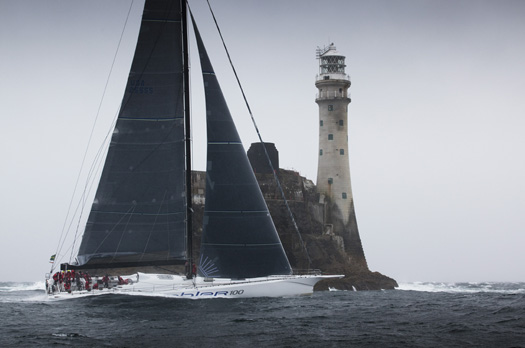
Rambler 100 rounds the Fastnet Rock. Photo: Daniel Forster/Rolex
RNLI Baltimore's lifeboat and the Irish Coast Guard are currently attending. Coastguard helicopters have also been dispatched, with naval vessel LE Clara giving assistance. The rescue effort has been hampered by misty conditions in the area this evening.
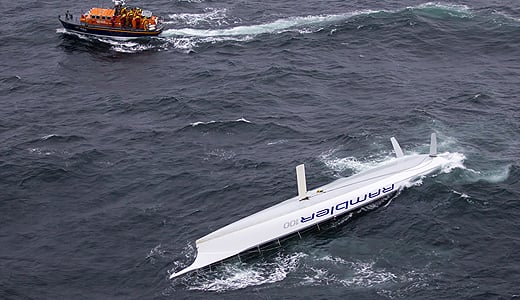
Baltimore lifeboat at the scene of the capsized Rambler 100. Photo: Carlo Borlenghi/Rolex
Rambler 100 recently set a new world record for the almost 3,000-nautical mile transatlantic crossing from Newport, Rhode Island to Lizard Point in Cornwall with a time of 6 days, 22 hours, 8 minutes and 2 seconds.
In other Fastnet action, there was disaster in IRC Z this afternoon for co-skippers Karl Kwok and Jim Swartz’s Farr 80 Beau Geste (HKG).
The yacht suffered a ‘structural problem’ while mid-away across the Celtic Sea en route to the Rock. She has since turned her bow back towards Land’s End.
Yesterday there was another high profile retirement when Johnny Vincent’s TP52 Pace (GBR) returned to her berth in the Hamble with mast problems.
In the Class 40s John Harris’ GryphonSolo2 (USA) has also pulled out, retiring to Dartmouth with sail damage.
- Fastnet
- Cork
- Rolex Fastnet Race
- Lifeboat
- Coastguard
- Irish Coast Guard
- Transatlantic
- Hamble
- Search and Rescue
- Fastnet Rock
- Department of Transport
- world record
- Helicopter
- 2011
- capsize
- TP52
- Land's End
- Rambler 100
- RNLI Baltimore
- IRC Z
- Kark Kwok
- Jim Swart
- Farr 80
- Beau Geste
- Johnny Vincent
- Pace
- John Harris
- GryphonSolo2
- Dartmouth
- Class 40



























